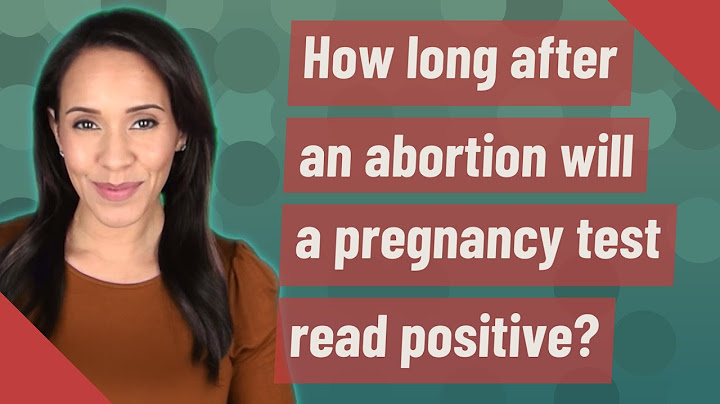When you think you might be unexpectedly pregnant, it can feel like torment waiting to know for sure. You might have sore breasts, mild cramping, and other signs of early pregnancy that could also be premenstrual symptoms, and it causes you to waver back and forth, thinking you are pregnant and then thinking you are not. That can leave you feeling more confused and wondering how soon you can get the answers you need. You have seen ads for pregnancy tests that claim to detect pregnancy five days before your expected period. So, should you test that early? How soon is too early to test for pregnancy? Could you be further along in pregnancy than you think? Show
When Is It Too Early to Test for Pregnancy?If you take a pregnancy test before you have missed your period, you increase your chances of getting a false negative result. This means the test will read negative when you actually are pregnant, so experts recommend waiting until you have already missed your period to prevent false-negative test results. Why Wait?As hard as it is, it is best to wait so that if you are pregnant, your body has enough time to produce human chorionic gonadotropin (hCG), the hormone that a pregnancy test will detect in your urine. Your peace of mind in knowing your result is accurate is worth it! How Do Pregnancy Tests Work?After sex, an egg is fertilized with sperm (fertilization). The fertilized egg travels to the uterus and attaches into the uterine lining (implantation). Implantation occurs about 7-14 days after you have had sex, and it triggers your body to start producing the pregnancy hormone, hCG. Your hCG levels will double every 48-72 hours after implantation, and it is important to give those levels time to climb. What About Early Pregnancy Tests?Early pregnancy test manufacturers market to your desire to get answers as early as possible. It is not hard to see the advertising on the box and read the claims of 99% accuracy along with the ability to detect pregnancy six days before your missed period. But let us take a closer look, so you do not test too early for pregnancy. The first thing to consider is that the percentage provided on the front of the package is only accurate when you take the test on the day of your expected period — and in a laboratory setting by professionals. The same goes for the the instructions printed inside the pregnancy test kit; the claims of accuracy are elevated because they do not reflect real-life testing in real-life situations. The results from a University of New Mexico study reveal the chances you can anticipate getting the right answer from an early home pregnancy test:
When Is the Best Time in Your Cycle to Test?Although your body begins to produce hCG 7 to 10 days after fertilization, waiting provides the most accurate results. In order to give your body enough time for hCG to build up to a detectable level in your urine by a pregnancy test, it is best to take a pregnancy test about 14 days after fertilization. For a woman who has a 28-day cycle and ovulates 14 days after her last period, this would mean testing on the day you expect your next period if you suspect you are pregnant. For the most accurate results, take a pregnancy test a couple of days after your missed period. If your test is negative and your period does not start, you still might be pregnant, but your hCG levels are just not high enough to register on the test. Most testing kit instructions recommend you wait one week to take another test; however, many women test a few days later. Contact a healthcare professional if you still have a negative pregnancy test or have further questions. When Is the Best Time of Day to Take a Pregnancy Test?The best time of day to take a pregnancy test is first thing in the morning because at that time your urine contains the highest concentration of hCG. This is particularly important the earlier you are taking your pregnancy test. You can test later in the day, but you will have a higher chance of seeing a false-negative test result because your urine will be diluted. Tips for testing include:
Hopefully, this information is helpful to understand the value of not testing too early for pregnancy, so you can have peace of mind knowing your results are accurate. If you think you might be unexpectedly pregnant, Willow Womens Center is here for you. We offer medical-grade pregnancy testing at no cost to you. Our licensed healthcare professionals provide other no-cost services that empower you to make informed decisions that you are comfortable with. Make your appointment today by calling 608-312-2025 or use our online scheduler. How soon will an early pregnancy test read positive?The earliest you can get a positive result on the most sensitive pregnancy tests is 3-4 days after implantation, 11-12 days after ovulation/fertilization or about 2 days prior to your next period. But the majority of home pregnancy tests will not be positive until you miss a period.
How long does it take for hCG to show up in urine?hCG is a hormone produced by your placenta when you are pregnant. It appears shortly after the embryo attaches to the wall of the uterus. If you are pregnant, this hormone increases very rapidly. If you have a 28 day menstrual cycle, you can detect hCG in your urine 12-15 days after ovulation.
|

Related Posts
Advertising
LATEST NEWS
Advertising
Populer
Advertising
About

Copyright © 2024 toptenid.com Inc.


















